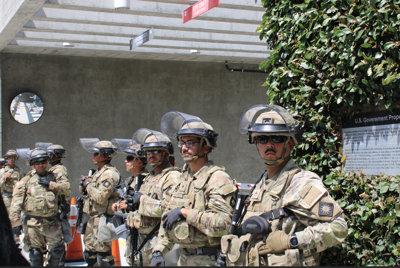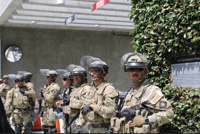
The National Guard at a Los Angeles protest against immigration enforcement. (Photo by Amairani Hernandez/CALÓ News )
From Los Angeles, where the concrete heart bleeds dust and forgotten memory, this is the story of two Californians caught in different corners of the same state machinery: the soldier and the undocumented worker. Both are Macehualmeh, working people made disposable.
The truth is simple: California residents are being priced out of their constitutional rights.
Whether refusing an unlawful military order or asserting basic due-process protections during an immigration enforcement encounter, the state has quietly imposed a tariff on conscience. Exercising a negative right, the right to be free from coercion, now carries an economic penalty so severe that most people cannot afford to use it.
This is the hidden surcharge that undermines democratic accountability. It affects our veterans, our migrants, our working families, the backbone of the state that claims to protect them.
The military subordinate’s dilemma
Consider the soldier stationed in California, one of the largest military hubs in the nation. He swears an oath to the Constitution, not to the shifting winds of political authority. Under U.S. and international law, he is obligated to refuse any order that is manifestly unlawful.
But the moment he attempts to exercise that duty, the machinery of military justice turns against him. Under the Uniform Code of Military Justice, refusal to follow orders, even illegal ones, is immediately charged as a violation of Articles 90 or 92. The burden of proof falls entirely on the subordinate.
The legal and financial consequences are devastating.
Because military defense counsel cannot challenge command authority, the soldier must hire “conflict-free civilian counsel.” The cost: $40,000 to $100,000 upfront. This is not simply legal representation, it is the price of institutional independence, a fee the state forces individual service members to shoulder.
If he loses, the consequences are catastrophic: $1t $3 million in lifetime earnings, benefits, and pension losses.
California invests heavily in supporting active-duty families and veterans. Yet the system they serve offers them no meaningful pathway to challenge illegal orders without risking financial ruin. Positive rights, such as the right to a public defender, are funded. Negative rights, like refusing unlawful coercion, are not.
This creates an effective immunity for high-ranking officials who issue unlawful commands. It is a structural flaw with profound California implications, especially as the state continues to host service members from diverse backgrounds who may face political or ethical conflicts.
The irregular Californian’s burden
Now shift the lens to the undocumented Californian, the farmworker in Kern County, the caregiver in Los Angeles, the day laborer in San Jose. California holds the largest undocumented population in the nation; these residents are part of our labor force, our tax base, our communities.
Yet for them, the constitutional right to due process is nearly impossible to exercise.
Legally, undocumented residents are entitled to claim protections against unlawful searches, warrantless raids or coercive interrogation. In practice, asserting these rights can trigger detention, deportation or separation from their children. The very act of speaking up becomes a risk.
This is status as irregular, a condition in which the undocumented Californian becomes vulnerable to both state and private actors.
The constant threat of ICE and CBP produces chronic fear, anxiety and PTSD. It also creates opportunities for exploitation. In Los Angeles, we have seen “community kidnappings,” where criminals impersonate immigration agents to extort families. These incidents flourish in the climate of fear that state policy helps create.
The economic calculus is cruelly predictable:
A soldier cannot afford to assert his duty to refuse an unlawful order.
An undocumented Californian cannot afford to assert her right to challenge unlawful enforcement.
Both are effectively priced out of constitutional protections.
California’s role in breaking the cycle
If California is to live up to its values, as a state that protects working people, immigrants, and veterans, it must confront this structural inequity.
For service members, California’s congressional delegation and state leadership should push for a federally funded Independent Military Defense Agency, modeled after the Public Defender system, dedicated to representing service members who challenge unlawful orders. No Californian in uniform should have to risk lifelong financial ruin to uphold the Constitution.
For undocumented residents, California must continue strengthening legal services for immigrants — but also develop programs that reduce the fear-based barriers that make rights unusable. This includes community-based defense networks, expanded U-visa certification for crime victims and stronger oversight of fraudulent or coercive immigration-related schemes that target vulnerable communities.
For the broader public, we must recognize the shared architecture of coercion that affects both groups. The soldier and the undocumented resident are not opposites; they are bound by the same structure. Both face a system where the state underfunds negative rights to maintain control, while generously funding positive rights that maintain order.
The issue is not only military justice or immigration enforcement — it is the widening gap between the rights we claim to guarantee and the economic barriers we impose on those who attempt to use them.
Reclaiming the duty to refuse
California has long been a place where people come not just to work, but to rebuild dignity. That dignity depends on the ability to say no to unlawful power, without losing everything.
We must reclaim the principle that has animated every struggle for justice in this state:
Rights mean nothing if they cannot be exercised.
The Commander-in-Chief once confessed his favorite word: tariff. We have found its truest meaning not in commerce, but in the marketplace of human spirit, a prohibitive surtax charged on the sacred duty to disobey.
The soldier’s conscience cannot be subject to a financial tariff.
The undocumented worker’s humanity cannot be held hostage by fear.
The macehualmeh, the workers who sustain this state, deserve more than symbolic protections.
From the Central Valley to the borderlands to the bases along our coast, Californians know that resilience grows from the deepest roots. We have endured droughts, fires, recessions, Prop 187, Pete Wilson and political storms. We can confront this injustice too.
Nican tomacehualmeh. We are here. And the duty to disobey, the duty to uphold justice, cannot be silenced by the price the state demands.











(0) comments
Welcome to the discussion.
Log In
Keep it Clean. Please avoid obscene, vulgar, lewd, racist or sexually-oriented language.
PLEASE TURN OFF YOUR CAPS LOCK.
Don't Threaten. Threats of harming another person will not be tolerated.
Be Truthful. Don't knowingly lie about anyone or anything.
Be Nice. No racism, sexism or any sort of -ism that is degrading to another person.
Be Proactive. Use the 'Report' link on each comment to let us know of abusive posts.
Share with Us. We'd love to hear eyewitness accounts, the history behind an article.